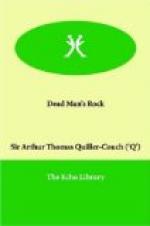This brings me to my grandfather’s Will, discovered amongst his papers after his death; and surely no stranger or more perplexing document was ever penned, especially as in this case any will was unnecessary, seeing that only one son was left to claim the inheritance. Men guessed that those dark years of seclusion and self-repression had been spent in wrestling with memories of a sinful and perhaps a criminal past, and predicted that Amos Trenoweth could not die without confession. They were partly right, from knowledge of human nature; and partly wrong, from ignorance of my grandfather’s character.
The Will was dated “June 15th, 1837,” and ran as follows:—
“I, Amos Trenoweth, of Lantrig, in the Parish of Polkimbra and County of Cornwall, feeling, in this year of Grace Eighteen hundred and thirty-seven, that my Bodily Powers are failing and the Hour drawing near when I shall be called to account for my Many and Grievous Sins, do hereby make Provision for my Death and also for my son Ezekiel, together with such Descendants as may hereafter be born to him. To this my son Ezekiel I give and bequeath the Farm and House of Lantrig, with all my Worldly Goods, and add my earnest hope that this may suffice to support both him and his Descendants in Godliness and Contentment, knowing how greatly these excell the Wealth of this World and the Lusts of the Flesh. But, knowing also the mutability of earthly things, I do hereby command and enjoin that, if at any time He or his Descendants be in stress and tribulation of poverty, the Head of our Family of Trenoweth shall strictly and faithfully obey these my Latest Directions. He shall take ship and go unto Bombay in India, to the house of Elihu Sanderson, Esquire, or his Heirs, and there, presenting in person this my last Will and Testament, together with the Holy Bible now lying in the third drawer of my Writing Desk, shall duly and scrupulously execute such instructions as the said Elihu Sanderson or his Heirs shall lay upon him.
“Also I command and enjoin, under pain of my Dying Curse, that the Iron Key now hanging from the Middle Beam in the Front Parlour be not touched or moved, until he who undertakes this Task shall have returned and have crossed the threshold of Lantrig, having duly performed all the said Instructions. And furthermore that the said Task be not undertaken lightly or except in direst Need, under pain of Grievous and Sore Affliction. This I say, knowing well the Spiritual and worldly Perils that shall beset such an one, and having myself been brought near to Destruction of Body and Soul, which latter may Christ in His Mercy avert.
“Thus, having eased my mind of great and pressing Anguish, I commend my soul to God, before Whose Judgment Bar I shall be presently summoned to stand, the greatest of sinners, yet not without hope of Everlasting Redemption, for Christ’s sake. Amen.
“Amos Trenoweth.”




